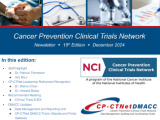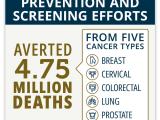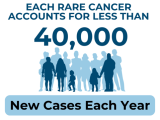The Tomosynthesis Mammographic Imaging Screening Trial (TMIST) has reached its enrollment goal of 108,508 women, as announced today by the ECOG-ACRIN Cancer Research Group (ECOG-ACRIN). The study, funded by the National… Learn more
POSTED: 1/15/2025
SOURCE: ECOG-ACRIN Press Release
Latest News, Upcoming Events, Notice of Funding Opportunities (NOFOs): Cancer Risk and Prevention
POSTED: 1/14/2025
SOURCE: DCP Updates

Over the last five decades, the number of deaths from many cancer types has dropped substantially in the U.S. A range of factors have played a role in this decrease. These include better treatments, prevention efforts such… Learn more
POSTED: 1/14/2025
SOURCE: NIH Research Matters

The National Cancer Institute (NCI) has selected two assays to be included in the Vanguard Study: Avantect® Multi-Cancer Detection Test by ClearNote Health and Shield™ Multi-Cancer Detection Test by Guardant Health.
POSTED: 1/7/2025
SOURCE: DCP News

As 2024 draws to a close, we take a moment to reflect on the impactful year for the US-Latin American-Caribbean HIV/HPV-Cancer Prevention Clinical Trials Network (ULACNet). Now in its sixth year, the network continues to… Learn more
POSTED: 12/17/2024
SOURCE: DCP News

Staff Highlight, CP-CTNet Leadership Retirement Recognition, Recommended Reading, Clinical Trials & EDI, DMACC Updates, Research Funding Opportunities, Active and DCP-Approved Studies, Upcoming Events
POSTED: 12/17/2024
SOURCE: DCP News

Improvements in cancer prevention and screening have averted more deaths from five cancer types combined over the past 45 years than treatment advances, according to a modeling study led by researchers at the National… Learn more
POSTED: 12/5/2024
SOURCE: NCI Press Release
The Cancer Prevention Fellowship Program (CPFP), NCI’s distinctive postdoctoral fellowship program that combines independent, mentored research with training in translational cancer prevention science, population health,… Learn more
POSTED: 12/5/2024
SOURCE: Cancer Prevention Science Blog
Upcoming Events, Latest News, Notice of Funding Opportunities, Reminders
POSTED: 12/3/2024
SOURCE: DCP Updates

Research is underway to try to address the many unanswered questions about cancer screening with multi-cancer detection (MCD) tests, a new type of blood test designed to detect multiple cancers.
POSTED: 12/2/2024
SOURCE: Cancer Prevention Science Blog

The National Cancer Institute (NCI) Division of Cancer Prevention (DCP) is pleased to announce the 2025 cohort of the DCP Early Career Scientist Spotlight Research Seminar Series. These nine investigators are advancing… Learn more
POSTED: 11/26/2024
SOURCE: DCP News

For those participating in the 2024 Symposium, consider attending these sessions to learn about the latest from DCP-funded research from NCORP and the Grand Challenges Program. Check out the full online program: https://… Learn more
POSTED: 11/25/2024
SOURCE: DCP News

Latest News, Notice of Funding Opportunities (NOFOs), and Upcoming Event
POSTED: 11/20/2024
SOURCE: DCP Cancer Symptom Science Updates
Latest News, Upcoming Events, Notice of Funding Opportunities (NOFOs), In Case You Missed It
POSTED: 11/14/2024
SOURCE: DCP Updates

The 36th IPVC & Basic, Clinical and Public Health Scientific Workshops will be held in Edinburgh, UK, November 12-15, 2024. The theme is “Equitable, Evidence-Based Approaches to HPV Disease,” and sessions will be… Learn more
POSTED: 11/12/2024
SOURCE: DCP News
Studying the evolution of cancer malignancy in space and time provides clues that are crucial for understanding how tumors develop, how they evade the immune system, and how they resist therapy and recur. Since 2018, the… Learn more
POSTED: 10/30/2024
SOURCE: Nature

The use of telehealth in cancer care surged during the COVID-19 pandemic, when, for a period of time, in-person medical care was limited and many visits to the doctor went virtual. Despite some recent pullbacks in telehealth… Learn more
POSTED: 10/28/2024
SOURCE: NCI Cancer Currents Blog
Upcoming Events, Latest News, Notice of Funding Opportunities (NOFOs), Reminders
POSTED: 10/22/2024
SOURCE: DCP Updates

This hybrid NASEM MCD workshop will examine the state of the science for clinical use of multi-cancer detection (MCD) tests. The NCI Division of Cancer Prevention staff will present on Monday, October 28. View the MCD Public… Learn more
POSTED: 10/17/2024
SOURCE: DCP News

The Biomedical Engineering Society (BMES) Annual Meeting will be held October 23-26, 2024, in Baltimore. “Synergizing Research and Cultural Excellence” is this year’s theme. The NCI Division of Cancer Prevention staff will… Learn more
POSTED: 10/15/2024
SOURCE: DCP News

In July, the Food and Drug Administration (FDA) approved the first blood test to use as primary screening for people at average risk for colon cancer. Although some experts said they are excited about the prospect of the… Learn more
POSTED: 10/11/2024
SOURCE: NCI Cancer Currents Blog

Breast cancer is the second most common cancer in women behind skin cancer, with approximately 13.1% of women estimated to receive a diagnosis of breast cancer at some point in their lifetime. The National Cancer Institute (… Learn more
POSTED: 10/3/2024
SOURCE: Fors Marsh Podcast

At the Rare Cancers Prevention and Interception workshop this year, cancer researchers from across the United States, Canada, and the United Kingdom and from across disciplines sought to address many of the issues that can… Learn more
POSTED: 10/1/2024
SOURCE: Cancer Prevention Science Blog
Emergency Notice, Upcoming Events, Latest News, Notice of Funding Opportunities (NOFOs), Reminders
POSTED: 10/1/2024
SOURCE: DCP Updates
Researchers have found that olanzapine may be more effective in controlling severe nausea and improving the quality of life in patients with cancer who are undergoing treatment with chemotherapy, according to new findings… Learn more
POSTED: 9/30/2024
SOURCE: ASCO News

